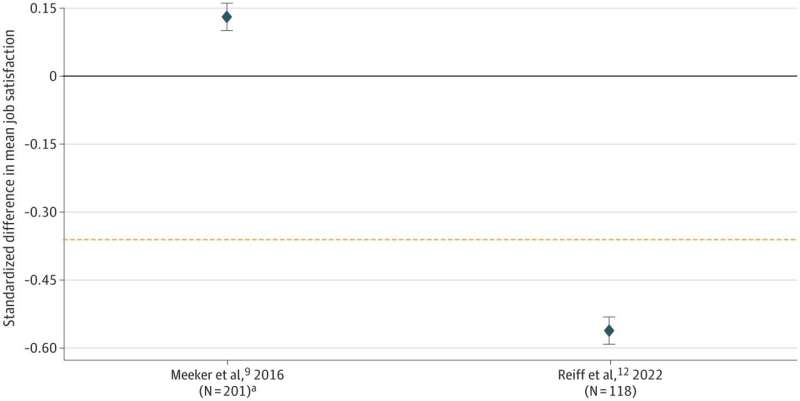This article has been reviewed according to Science X's editorial process and policies. Editors have highlighted the following attributes while ensuring the content's credibility:
fact-checked
peer-reviewed publication
trusted source
proofread
Comparing doctors to peers doesn't make them hate their jobs and may improve quality of care, says new study

Showing people how their behavior compares to their peers is a commonly used method to improve behavior. But in the wake of a global pandemic that exacerbated health care providers' job dissatisfaction and burnout, questions remain about the potentially negative effects of peer comparison on the well-being of clinicians.
A new study from the USC Schaeffer Center for Health Policy & Economics reveals fresh insights into the relationship between peer comparison and job satisfaction among clinicians. Published in JAMA Network Open, the study challenges prior findings that such feedback increases job dissatisfaction and burnout.
Researchers found that behavioral interventions aimed at improving performance can be designed to protect clinician job satisfaction and improve quality of care. To avoid negative impact, the research team discovered it is important for clinicians to have control over the behavior being evaluated or encouraged, such as ordering tests or whether to prescribe medication.
"Our research demonstrates that peer comparison aimed at improving performance can be designed in a manner that safeguards clinician job satisfaction," said lead author Jason Doctor, co-director of the Behavioral Sciences Program at the USC Schaeffer Center and chair of the Department of Health Policy and Management at the USC Sol Price School of Public Policy. "Prior findings to the contrary don't appear tied to peer comparison, but rather clinicians being measured for things they don't have full control over."

The importance of methodology in peer comparison
Performance feedback using peer comparison is a widely used approach in healthcare to change behavior. Study authors emphasize the importance of methodology when conducting peer comparison intervention. They note the present study gave clinicians full agency over the outcome, kept performance private, did not restrict the number of top performers, and was successful in improving clinician behavior without lowering job satisfaction.
Doctor and his team evaluated data from their previously published research that assessed the impact of three interventions—Suggested Alternatives, Accountable Justification, and Peer Comparison—to reduce inappropriate antibiotic prescribing. In this study, they looked specifically at the data on peer comparison, where clinicians received an email informing them of their ranking, from highest to lowest, for inappropriate prescriptions compared to their peers.
The findings contribute to the ongoing dialogue surrounding healthcare quality improvement and clinician well-being.
"By better understanding behavioral interventions and developing more effective strategies, healthcare organizations can foster a sense of ownership and agency, leading to improved job satisfaction and decreased burnout rates," said Doctor.
More information: Jason N. Doctor et al, Clinician Job Satisfaction After Peer Comparison Feedback, JAMA Network Open (2023). DOI: 10.1001/jamanetworkopen.2023.17379



















